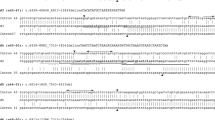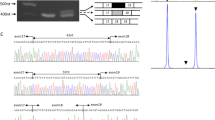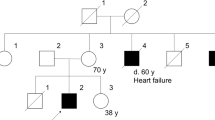Abstract
Duchenne and Becker muscular dystrophy (DMD and BMD) genes are located in Xp21 on the short arm of the X chromosome. DMD patients display a much more severe clinical course than BMD patients, and yet about 10% of cases of each have been reported to have deletions for parts of the gene. Using a complementary DNA subclone of the DMD gene we have screened 66 DMD and BMD patients who had not previously shown deletions with the probes then available. Fifteen patients have a deletion of this part of the gene, indicating a higher deletion frequency in this region (22%). Exons were deleted in five severely affected DMD patients and in ten BMD patients. Significantly, most of these deletions begin in the same region of the cDNA, which implies that there is a common mechanism for the generation of many of these mutations. An apparently identical deletion in one family gave classical BMD in two brothers (presenting in their teens) and only very mild muscle weakness in their 86-year-old great-great-uncle. Taking these data together with data using the probes previously published, we are able to detect deletions directly in 40% of our families requiring antenatal diagnosis or carrier detection.
This is a preview of subscription content, access via your institution
Access options
Subscribe to this journal
Receive 51 print issues and online access
$199.00 per year
only $3.90 per issue
Buy this article
- Purchase on Springer Link
- Instant access to full article PDF
Prices may be subject to local taxes which are calculated during checkout
Similar content being viewed by others
References
Emery, A. E. H. Oxford Monographs on Medical Genetics, No. 15: Duchenne Muscular Dystrophy (Oxford University Press, 1987).
Lindenbaum, R. H., Clarke, G., Patel, C., Moncrieff, M. & Hughes, J. T. J. med. Genet. 16, 389–392 (1979).
Davies, K. E. et al. Nucleic Acids Res. 11, 2303–2312 (1983).
Kingston, H. M., Sarfarazi, M., Thomas, N. S. T. & Harper, P. S. Hum. Genet. 67, 6–17 (1984).
Kunkel, L. M., Monaco, A. P., Middlesworth, W., Ochs, H. D. & Latt, S. A. Proc. natn. Acad. Sci. U.S.A. 82, 4778–4782 (1985).
Kunkel, L. M. et al. Nature 322, 73–77 (1986).
Ray, P. N. et al. Nature 318, 672–675 (1985).
Smith, T. J. et al. Nucleic Acids Res. 15, 2167–2174 (1987).
Monaco, A. P. et al. Nature 323, 646–650 (1986).
Koenig, M. et al. Cell 50, 509–517 (1987).
J. med. Genet. December issue (1986).
Monaco, A. P. & Kunkel, L. M. Trends Genet. 3, 33–37 (1987).
Robertson, M. Nature 327, 372–373 (1987).
Brockdorff, N. et al. Nature 328, 166–168 (1987).
Cross, G. S. et al. EMBO J. (in the press).
Burghes, A. H. M. et al. Nature 328, 434–437 (1987).
Davies, K. E. et al. J. med. Genet. (in the press).
Author information
Authors and Affiliations
Rights and permissions
About this article
Cite this article
Forrest, S., Cross, G., Speer, A. et al. Preferential deletion of exons in Duchenne and Becker muscular dystrophies . Nature 329, 638–640 (1987). https://doi.org/10.1038/329638a0
Received:
Accepted:
Issue Date:
DOI: https://doi.org/10.1038/329638a0
This article is cited by
-
Molecular characterization of exonic rearrangements and frame shifts in the dystrophin gene in Duchenne muscular dystrophy patients in a Saudi community
Human Genomics (2018)
-
Characterization of deletion breakpoints in patients with dystrophinopathy carrying a deletion of exons 45–55 of the Duchenne muscular dystrophy (DMD) gene
Journal of Human Genetics (2009)
-
Technology Insight: therapy for Duchenne muscular dystrophy—an opportunity for personalized medicine?
Nature Clinical Practice Neurology (2008)
-
Deletion and duplication screening in the DMD gene using MLPA
European Journal of Human Genetics (2005)
-
A 400-kb tandem duplication within the dystrophin gene leads to severe Becker muscular dystrophy
Journal of Neurology (1994)
Comments
By submitting a comment you agree to abide by our Terms and Community Guidelines. If you find something abusive or that does not comply with our terms or guidelines please flag it as inappropriate.



